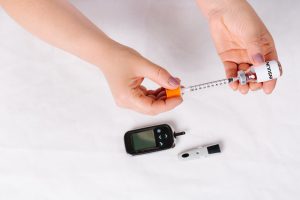 Diabetes and insulin resistance both involve some of the same elements. Specifically, a key factor in both conditions is the inability of the pancreas to produce enough insulin to control blood sugar levels in your body. Insulin allows your cells to absorb sugar from the blood, providing these cells with the energy they need to function and keep blood sugar levels normal.
Diabetes and insulin resistance both involve some of the same elements. Specifically, a key factor in both conditions is the inability of the pancreas to produce enough insulin to control blood sugar levels in your body. Insulin allows your cells to absorb sugar from the blood, providing these cells with the energy they need to function and keep blood sugar levels normal.
Despite the similarities in terms of how insulin resistance and diabetes work, not everyone with one has the other. In a person with insulin resistance, cells in the muscles, fat, and liver do not respond as well as they should to insulin; the pancreas may be producing a normal amount of insulin, but because cells are not processing it effectively, this normal amount is not enough to support these cells’ ability to function.
A person with Type 1 or Type 2 diabetes can experience insulin resistance, but not everyone with diabetes is necessarily insulin resistant. Type 2 diabetes can occur as a result of the pancreas not making as much insulin as it’s normally supposed to; while the body’s cells may still be able to process insulin normally, not enough of it is being produced to support cell functions. This also occurs in people with Type 1 diabetes due to their immune system targeting insulin-producing cells in the pancreas.
Insulin resistance also doesn’t necessarily lead to diabetes in everyone who experiences it. While it can progress into prediabetes and, eventually, Type 2 diabetes if left untreated, it’s also associated with other conditions, including cardiovascular disease, fatty liver disease, metabolic syndrome, and polycystic ovary syndrome. Insulin resistance also isn’t necessarily a chronic condition; it can occur temporarily in some people.
If you’re experiencing symptoms of either insulin resistance or diabetes, you can receive treatment from an endocrinologist at Flushing Hospital Medical Center’s Ambulatory Care Center. To schedule an appointment, please call (718) 670-5486.
All content of this newsletter is intended for general information purposes only and is not intended or implied to be a substitute for professional medical advice, diagnosis or treatment. Please consult a medical professional before adopting any of the suggestions on this page. You must never disregard professional medical advice or delay seeking medical treatment based upon any content of this newsletter. PROMPTLY CONSULT YOUR PHYSICIAN OR CALL 911 IF YOU BELIEVE YOU HAVE A MEDICAL EMERGENCY.
